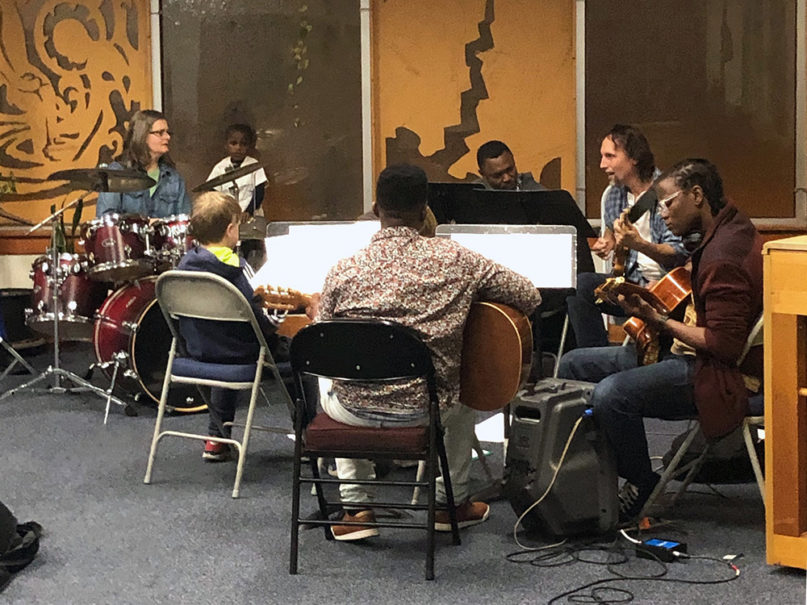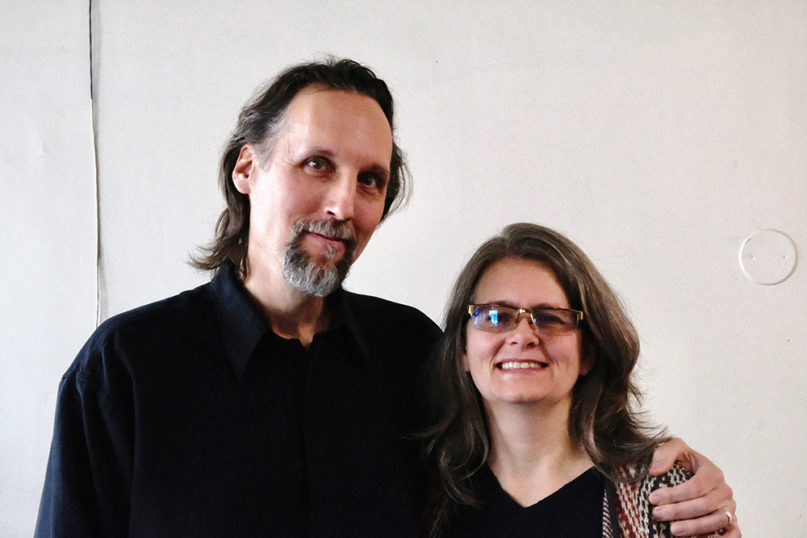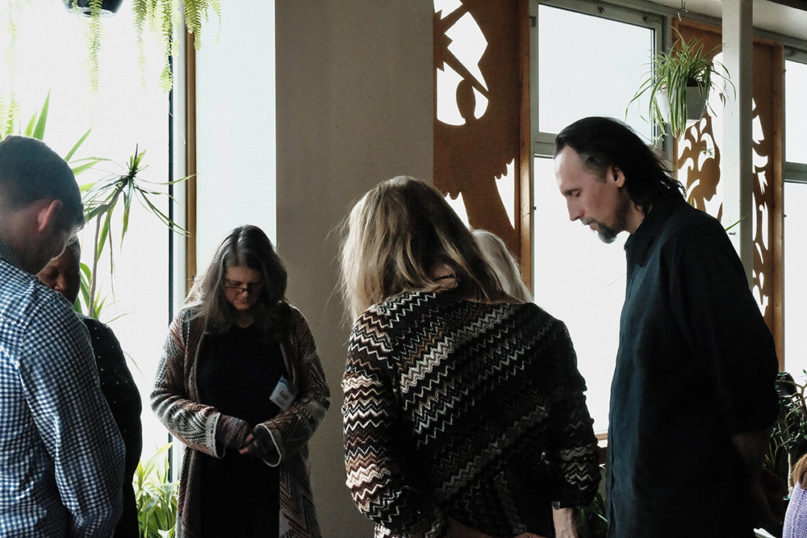Part One:
CHICAGO (RNS) — Chicago’s known for great architecture, but the one-story building at the corner of Pratt and Ashland is no landmark. The red brick rectangle used to be a discount store. Inside, there’s a sparse room with a dull navy carpet, and on a recent Monday night, a dozen musicians sit on mismatched chairs.
If not for the 8-foot pine cross stuck on a chunk of plywood at the front of the room, you might not guess this is a church. The band members — kids as young as 5 up to adults in their 50s — are a mix of native Midwesterners, refugees, and immigrants.
They play maracas, ukuleles, guitars, keyboards and a scratched-up drum kit. They work their way through a song you won’t find in a hymnal: “Should I Stay or Should I Go,” the ’80s punk rock anthem by The Clash.
Welcome to the Monday night Jam Session at Living Water Community Church. Your hosts: Al and Andi Tauber.
Al’s the wild-eyed, long-haired guy in the center with an electric guitar and a striking resemblance to a widely reproduced painting of a white Jesus. His wife Andi’s the one with unobtrusive glasses and a mischievous grin, gliding between the piano and drums.
With joy — and optimism — and generosity, people learn words in new languages, trade instruments, make mistakes, and play on. With Al as the pied piper and Andi keeping time, the Taubers manage to lead without grabbing the spotlight.
Everything they do — their work, their music, their marriage — involves a kind of deep listening. An ear for changes in rhythm and key. An ability to respond to others, to have faith the song will find its way. Even if it falls into chaos sometimes. Even if you have to stop and start again.
“There’s this other side of what we do, which is a ministry of presence,” Al said, referring to his and Andi’s day jobs, reaching out to male street prostitutes. “The longer that I’ve worked here the more I’ve realized that some of the men will never get out of what they’re doing. We’ve had a lot of men with a lot of mental illness. And some of those men are gonna probably be stuck in this for the rest of their life.”

Andi Tauber, on drums, and her husband Al, right, on electric guitar, run a free, drop-in Monday jam session for aspiring musicians at their church in Chicago. Photo by Monique Parsons
Al sits close by Andi in one of the ministry’s tiny offices. His long legs stick out from under the desk. This faith-based nonprofit, which is separate from the Taubers’ church, is called Emmaus Ministries.
It’s named after a Bible story in the New Testament book of Luke. Its founder, a Catholic, started it more than 30 years ago after noticing there were few resources for sexually exploited men — prostitutes and victims of sex trafficking. Evangelical and Catholic churches, schools and individuals donate to the ministry, but the budget has been tight lately; it’s always been hard to raise money for this.
The ministry’s goal, at heart, is to get the men off the streets and bring them to Jesus. That’s what they tell their donors. Al and Andi believe that Jesus is the son of a loving God and that each person finds Jesus in their own way. How this happens takes a lot of listening without judgment, and a lot of time. Andi says they play a lot of games with the men: backgammon, card games, foosball. They don’t focus on the men’s sexuality; they do help the men get into detox, call parole officers and find jobs.
“This is sort of where we lean into the family end of things, of kind of being caught between being a social service and being a family,” Andi said. “And one of the things that family does or that friends do is just hang out together.”
All the way to the end.
“I’ve really come to see that God has also called us to just be there with these guys,” Al said. “When they die, someone needs to grieve for them, when they’re in the middle of their madness, they need to know that somebody loves them and somebody cares about them, and that’s a harder sell, I think, to donors.”
How it began
Andi and Al met in the mid-1980s at Illinois Wesleyan University, a small liberal arts college halfway between St. Louis and Chicago.
“Andi was singing on the quad the first day I saw her,” Al said.
So a singing music major from suburban Chicago met a guitar-playing history major from downstate Illinois. Before long, they were making music together. They had their differences: Andi is introverted, practical, likes to plan and looks on the bright side. Al’s emotional, prone to pessimism, a poet at heart. But they shared a love of music, a sharp wit and a common faith.
They came to Christianity through different doors: Al grew up with it; his mom helped lead a college youth group, and he read the Bible as a kid and admired the young missionaries he met at their dinner table. Andi joined a friend’s Presbyterian youth group in high school. She liked the leaders’ hippie vibe, but she says studying Christian feminist theologians in college — Phyllis Trible and Elisabeth Schussler Fiorenza — brought her to understand a Jesus who was deep and compassionate toward women.
In college, Al and Andi belonged to a Southern Baptist student group, and when they read from the Bible, the verses about justice echoed in their ears. They called it the Southern Baptist Church of Jimmy Carter, Al says, but after they got married and felt the denomination too focused on politics over good works, they found their way to a Mennonite church. Andi says they liked how the Mennonites lived simply, reached out to refugees, and filled their worship with song.

Al, left, and Andi Tauber met in the 1980s, when they were students at Illinois Wesleyan University. After trying different denominations, they settled on the urban Mennonite Church, and for the past 20 years they’ve worked with male street prostitutes in Chicago. Photo by Jules Wecker
After Andi performed at a benefit concert in Chicago, a friend recruited her to work for his little nonprofit.
“The opportunity came along, and I decided to try it,” Andi said.
She has worked at Emmaus Ministries for about 20 years. Al joined her there about 15 years ago.
“Most of the men that we work with are selling themselves for food, for money, for drugs, often for a place to stay,” Al said. “I met a man once who was out selling himself in order to get diapers for his kid.”
The more the couple worked with the men, the more they considered it a calling. They played various roles at Emmaus: Al ran an internship program for seminary students and renovated the offices; Andi ran the database and wrote the newsletter. They’ve spent hundreds of nights on the streets, looking for guys to help.
“Our guys,” they call them. Many grew up with abuse. Many are desperate, lonely and sweet.
“Yes, they struggle with mental illness, they have addiction issues and all those sorts of things,” Andi said. “But a lot of them are extremely tender-hearted and generous people, and they’re fun to be around.”
And they have stories.
“There’s so many inappropriate ones,” Al said with a chuckle. “I have a guy right now who says I’m going to leave Jesus to marry him.”
Many of the stories are hard to hear.
Sill Davis is a pastor at Emmaus; he’s worked with struggling gay men in Chicago since the ’80s. He met men whose fathers would beat them as children, sending their sons to school with black eyes. Sill remembers when only one funeral home in the city would accept men who had died of AIDS. Nobody knew what it was or how you got it.
“Early on, even in the hospitals, people were just really afraid,” Davis said. “There was a young man, he was in the hospital, and when they would serve his tray, his meals, they would slide it across the floor. He was too sick to get out of the bed to get it.”
Al and Andi are white, and most of the early clients were, too. Nowadays most are Black and Latino men. Many have HIV. Some are crack addicts. Its ministers say it’s always been hard to get other people to notice and care about these men. That’s why Al and Andi came up with a crazy pitch: What if they interviewed the men about their lives, turned the stories into songs, and performed them for live audiences?
“Basically we were doing a musical about male prostitutes,” Al said with a smile. “Which is just weird.”
Weird, maybe.
They had to convince their boss and his board of directors it was a good idea.
The ministry’s founder, John Green, recalls that they gave the Taubers “six months to just go and listen to guys, listen to these stories, and then weave it and craft it into something that we could present to churches and to colleges.”
They wrote monologues and original songs. They didn’t want to shame or exploit the men, so they changed the guys’ names to protect their identities and let them read over the drafts to make sure they rang true.
“The musical giftedness that Andi and Al bring, it’s just a beautiful way to communicate our mission,” Green said.
At a show at Asbury Theological Seminary in Wilmore, Kentucky, Andi and Al stood up front by the pulpit, singing a song about a man who said his life has passed him by.
They faced the polished wood pews, wearing matching outfits — black shirts, khaki pants; Andi’s light brown hair was long and in dreadlocks back then.
“Balanced was not a word I’d heard to describe my father. Let’s just say he wasn’t fair,” they sang. “Still, he tried to divide his time equally in between beatin’ me and just not bein’ there. Oh, you get used to it. You get used to it.”
They called their program “Stories from the Streets,” and they performed it dozens of times over the years. One show was about a funeral for one of the guys. He was 37 years old when he died. Often when the folks at Emmaus talk about their work, they talk about the guys who died.
A lot of them have, for lots of reasons.
“Maybe they’ve been taking medication and just stopped taking it,” Andi said.
Sill Davis recalls a man who had been strangled; his body was found floating in Lake Michigan. Other men have been victims of serial killers or heroin overdoses.
Others just give up, Andi said, and are filled with desperation and loneliness.
Al and Andi and Sill put on a lot of funerals.

Andi Tauber, center left, and her husband Al, right, pray before a Sunday morning worship service at Living Water Community Church in Chicago, a largely immigrant, urban Mennonite congregation. Photo by Jules Wecker
Sometimes amazing things happen: Once, a Chicago police officer showed up in the middle of a service. She was in full uniform, and she walked right down the aisle and told them she’d been friends with the guy.
“He found out that she sings,” Andi said, “and then he would get in her police car and say, ‘Sing me a song, Beautiful.’”
Then the cop faced everyone in the church, and she sang the gospel hymn, “His Eye Is on the Sparrow.”
“God just revealed something in that memorial that was such a comfort. It was just beautiful,” she said.
Al added: “Many times as I have prayed at a funeral which just seems so senseless, I hear God saying, ‘This is what I want you to do.’”
It’s been a few years since Al and Andi performed Stories from the Streets. The ministry budget couldn’t sustain paying musicians to do a roadshow, and the couple got called back to the office. The performances worked for a while: some of those college kids who saw it became interns or staff members and later, donors.
Al and Andi admit it took time to hit the right note.
“It was such a wrist-slitter program. I mean, it was so heavy and depressing the first couple times we did it,” he said, chuckling. “We’ve been doing music for years. We were looking at the audiences and going, ‘Oh my gosh, what have we done?’”
Al and Andi may be soft-hearted do-gooders, but they’re also quirky, and very funny.
One of my favorite Al songs is called “Duct Tape My Heart.” I heard them play it at a backyard concert last summer. It’s about a guy whose girlfriend breaks up with him at Home Depot. It made me smile and tear up at the same time.
That pretty much sums up what it’s like to spend a lot of time with Al and Andi.
Andi’s favorite movie is “Galaxy Quest,” the one about a cast of TV actors from a show like “Star Trek.” Real aliens show up, and it turns out they’ve been watching the show and use it as a model for their technology.
They bring the cast up to their spaceship and expect them to fly it.
“There’s just this painfully slow scene where everybody watching them, ready to cheer them on, just starts tilting their heads a little to the side, and the ship just starts going a little askew, and it starts scraping against the side of the docking bay,” Andi says. “I die all through that scene. I love that scene.”
For part two, click here.
The audio version of this story is available at RNS’ Beliefs podcast, at KALW, or on The Spiritual Edge.
This story is part of an ongoing audio series, Sacred Steps. It was produced by KALW’s The Spiritual Edge in collaboration with USC’s Center for Religion and Civic Culture and the Religion News Service. Monique Parsons reported from Chicago. Judy Silber is the executive editor of The Spiritual Edge. Cheryl Devall is the editor. Tarek Fouda is the sound engineer. For more stories from the Sacred Steps series, go to kalw.org. The story is part of the Spiritual Exemplars series, supported by the USC Center for Religion and Civic Culture.





